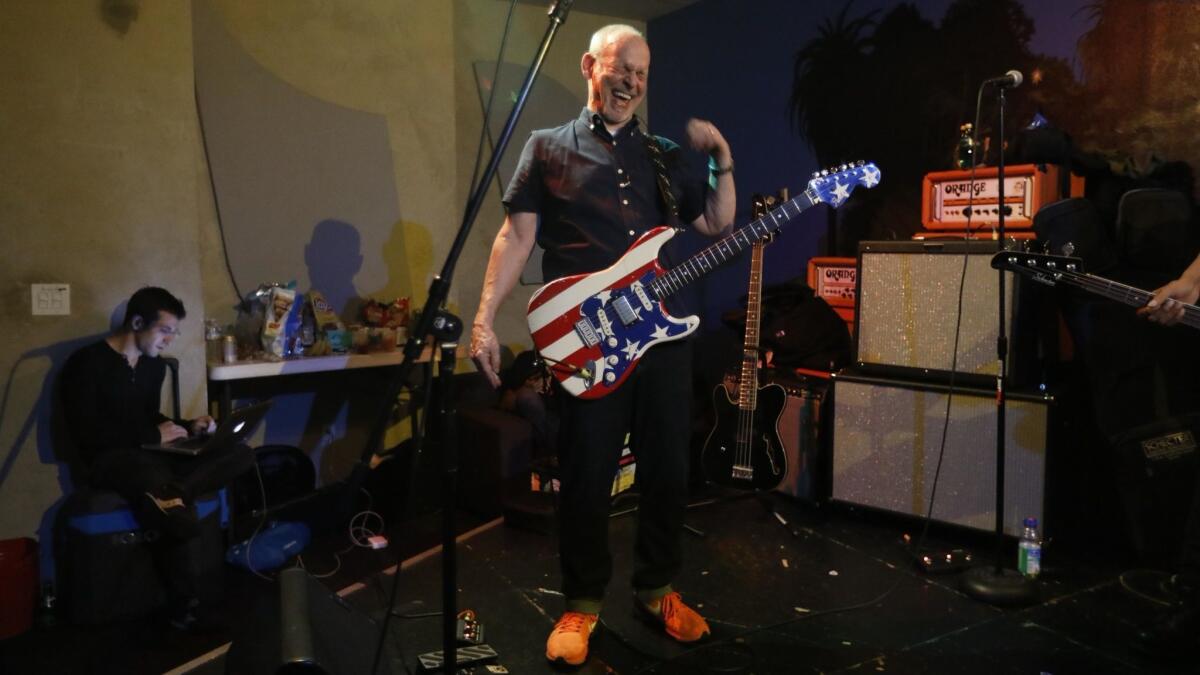The MC5’s Wayne Kramer fights for prison reform through rock ‘n’ roll

- Share via
Next month, MC5 co-founder Wayne Kramer celebrates 50 years since the Detroit protopunk greats released their landmark album “Kick Out the Jams.” But as the acclaimed guitarist gears up for the next leg of his “MC50” tour, he also marks a more sobering milestone: the four decades since he was released from federal prison for selling cocaine to undercover officers.
“Playing music in prison allowed me to process the pressure of life there,” Kramer, 71, recalls. “And it helped focus my thoughts on what was I going to do when I was released, and that I would hopefully be a better person.”
His resolve endured. In 2009, Kramer founded the U.S. arm of Billy Bragg’s correctional music nonprofit, Jail Guitar Doors. Named for the Clash song about Kramer’s sentence, the L.A.-based organization provides music equipment and education to about 140 correctional facilities across the U.S. The nonprofit also enlists academics, music professionals and top-tier talents like Perry Farrell and Tom Morello to help inmates express themselves through forming bands, producing, rapping and more.
On Saturday, Kramer will helm Rock Out 5, a one-night-only fundraiser at the Ford Theatres benefiting Jail Guitar Doors. The all-star lineup features a performance by Moby and his band, plus sets from Benmont Tench of Tom Petty and the Heartbreakers, the Soledad Jazz Workshop and surprise guests. We spoke with Kramer from his home in L.A. about his legacy, the program’s impact and the power of playing music in prison.
How has your own experience with incarceration informed your relationship with music?
I served a federal prison term in the 1970s, and I caught the tail end of the era of rehabilitation in American corrections. The focus shifted to punishment. Playing music while I was there allowed me to contribute to the community, by putting on regular performances on the yard, to bring a little joy to my fellow inmates’ lives. It’s a remarkable experience to see a room full of prisoners in a maximum security facility laugh and cheer and sing along with their fellows who have written these songs.
What kind of rehabilitation does playing music in prison provide?
The arts have the power to transform people. If I put a guitar in a guy’s hands and task him with writing a song to his mom or his son, it forces him to confront himself in a new, positive way. Also, the process of creativity teaches people how to collaborate. If people learn this while they’re in custody, they return to society in better shape than when they went in.
This year marks JGD’s 10th anniversary. What kind of impact has it had?
We have empirical data from longitudinal studies that shows a reduction in violence. There are less assaults on the yards where we have programs, and lower recidivism rates. It helps them cope with the stresses of everyday life.
What are the biggest obstacles to running a program like this?
Funding is always a challenge. If you’re saving baby seals, money comes flying out of people’s pockets. For adult felony offenders, not so much. But the real challenge is that we lock people up for too long, under terrible conditions. After a certain point, there’s nothing more to be gained by keeping people in prison. We found that once a guy gets to be 45 or 50 years old, he’s done being a gangster, a tough guy, a hustler. He just wants to have a house, a job and enjoy what life he has left.
What are Jail Guitar Doors’ goals for the future?
Our work has to extend out into the community. We’re trying to operate arts program in local community centers, to engage kids at the source of where their criminal involvement begins, so they have a place to do their music, theater, dance or writing. It’s about catching people before they get caught up in the criminal justice system.
Rock Out 5
The Ford Theatres, 2580 Cahuenga Blvd. E, L.A., Saturday.
$30-$150
More to Read
The biggest entertainment stories
Get our big stories about Hollywood, film, television, music, arts, culture and more right in your inbox as soon as they publish.
You may occasionally receive promotional content from the Los Angeles Times.










